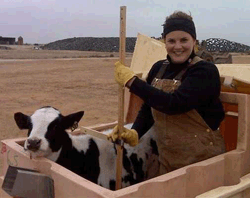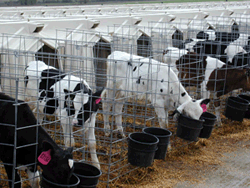Calf managers often focus on addressing sanitation, nutrition and general calf management concerns. But, how much time is really spent addressing employee-related issues? Could communication or the lack thereof be at the root of calf management challenges?

Before assessing whether communication is a limiting factor on an operation, there are a few questions managers may want to consider, advises Christie (Stanley) Underwood, calf and heifer specialist with Purina Animal Nutrition LLC.
Do employees understand what authority they have to make decisions?
Is there a system in place to report issues as they arise?
Is there an open line of communication between employees and managers?
How is the line of communication between managers and employees maintained?
Do employees feel comfortable conveying needs and misunderstandings to rectify a problem?
Are employees told what their specific duties are, and are their roles defined or is it a learn-as-you-go position?
"If you answered no to any of these questions, communication could be an issue," notes Underwood. To improve communication, managers should ensure that they are putting the right people in the right place, stick to their protocols and acknowledge employees that are doing quality work.

Put the right people in the right place
"I recently read the book Good to Great by Jim Collins. One key insight that I learned from this book, is to get the right people on the bus, get the wrong people off the bus and put the right people in the right place within the bus," says Underwood. (Click the following link for more information on Good to Great.)
Having the right person for the job strongly relates to calf operations. For instance, it is best that a patient, gentle person feed colostrum to newborns, whereas a fast-paced individual with an eye for detail would be a stronger fit for putting out bottles for calves. The latter must be sure to not let the milk/milk replacer get cold before the calf consumes it, but yet pays attention to calves that are not drinking. A strong calf manager must balance immediate needs and emergencies on an operation with the long-term goals. Assigning the right person for the job is one of these decisions that will affect the long-term success of an operation.
"When it comes to raising a healthy calf, one must never put off until tomorrow what needs to be done today," says Underwood.
Have a plan in place and stick to it
It is not uncommon for operations to accept deviation from the ideal procedure. This often happens as managers stray away from written protocols and the new standard gets passed from employee to employee. Underwood says that it is important that a protocol be a working document, so that when changes are made they are documented and thought through with management. A structured training process and re-evaluation of current practices can be an effective means to prevent future miscommunication. Involve employees in this process. Engaged employees are often more satisfied with their jobs and will most likely stay with the same employer for longer periods of time.
For instance many calf operations use nipples on bottles to feed calves (it is common to evaluate the opening of the nipple to make sure it is not too large so that the calf does not aspirate on fluid). Occasionally employees will carry a nipple or two in their pocket with the
 large opening so the fluid flows faster. This is neither sanitary and is certainly not adhering to protocol. But perhaps the employee in this scenario wasn't aware of the protocol for how calf nipples should be handled and why sanitation is important.
large opening so the fluid flows faster. This is neither sanitary and is certainly not adhering to protocol. But perhaps the employee in this scenario wasn't aware of the protocol for how calf nipples should be handled and why sanitation is important. A little education can go a long way and could pay dividends later, with increased calf health. Sanitation, feed and water bucket management, heifer movement and vaccination are other common examples where not communicating the importance of protocol could lead to long-term profit losses. Managers should encourage their employees to ask questions; open communication regarding expectations as well as changes can ease some of the burden.
Acknowledge a job well done
Many well-managed calf operations and dairies strive to hold employees accountable for their duties and offer public recognition for a job well done. Offering incentives for quality work is another positive way to show employees that their work does not go unnoticed. Also, never underestimate the power of just thanking an employee or telling them that they did a good job. This is often more meaningful than other forms of recognition.
For more information, contact Christie Underwood at (806) 640-8045, email CMUnderwood@landolakes.com or visit www.amplicalf.com.
Purina Animal Nutrition LLC (www.purinamills.com) is a national organization serving producers, animal owners and their families through more than 4,700 local cooperatives, independent dealers and other large retailers across the United States. Driven by an uncompromising commitment to animal excellence, Purina Animal Nutrition is an industry innovator, offering America's leading brands of complete feeds, supplements, premixes, ingredients and specialty technologies for the livestock and lifestyle animal markets. Headquartered in Shoreview, Minn., Purina Animal Nutrition LLC is a wholly owned subsidiary of Land O'Lakes, Inc.
10.30.2013